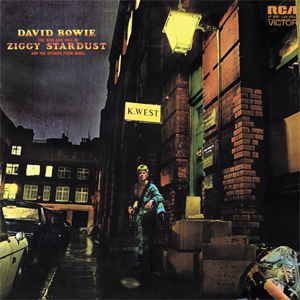Tuesday, May 5, 2015
"The Rise and Fall of Ziggy Stardust and the Spiders from Mars" by David Bowie (June, 1972)
Brad's Take:
I might be in the minority here, but I didn't enjoy this one as much as Hunky Dory. The first half was hard for me to get through. I pushed through it though (fortunately) because the last half of the album is mostly pretty great.
"It Ain't Easy" was the first song that I got to on here that I actually liked, and after that pretty much every song was enjoyable to me. I think I liked "Star" the most though.
To me, "Star" sounded like a song that a "rock n roll star" would sing in their own head while standing center stage, looking over a massive crowd. It almost sounded cocky, in a way. I liked it a lot though.
I think I'm beginning to get a decent idea of what David Bowie is all about now. I know that we have a few more Bowie albums coming up soon on our list, and I'm afraid all of my reviews of his album are going to be very similar. Hopefully he will surprise me soon because at this point I just don't really see the appeal yet.
Dad's Take:
I like the concept of this album, with the singer taking on the persona of a stranger in a strange land. Being a foreign observer means you can say stuff that others might not say about what you're observing, to explore themes that are not always talked about in the macho world of early seventies rock, like bisexuality and the phoniness of image.
The only problem is, I never quite believe it here. There's not doubt that Ziggy is Bowie wearing a mask, and that he loves that image, even when he knows it's phony. That's OK, but stories are always better when the author doesn't make himself so obvious. I forgive him though, largely because I've always really liked "Starman." Of course, the big hit here is "Suffragette City," which earns its popularity but stands out a little too much from the rest of the album, like "Changes" does on Hunky Dory. For me, this album has always been about "Starman." There are quite a few other great songs here. There's the T. Rex-like "Hang on to Yourself," the mood-setting "Five Years," which opens the album. "Ziggy Stardust" is a cool bit of pre-eighties glammy space rock in all its cartoon-like glory.
Bowie may be my generation's Oscar Wilde, so hiding in the shadows of his own work is not likely to happen. And as Oscar Wilde would have, Bowie cuts through one of the truths about metal bands--that behind the overt masculinity was a lot of teenage boys enjoying the physical image of the performers, whose androgeny might not have been as obvious as Bowie's, but it was a big part of their appeal to a large segment of their audience. Bowie just made it more open, and by doing so, helped create the disco culture and, especially, the eighties. I think Bowie foresaw the revelation of what was behind the rock, and opened the door for the rest of the seventies and eighties by killing it off with "Rock 'n' Roll Suicide." And "Suffragette City" drew the rock fans in to witness their own demise, without realizing yet what was about to happen to the radio within a couple years.
All that aside, this album goes beyond the surface glitter and glitz of glam rock. It actually has some depth. Between the messages, the story, the concept, the rock, and the sheer creativity of the songs, it's an enjoyable listen. More than that, it rises to the level of essential for understanding the period and, especially, what was about to happen to seventies when the often empty shell of disco glam took over. I don't mean to imply that that's what this album is, at all. But I think it helped move us in that direction.
The album might not be one of my favorites, but it is pretty good. I think I might like this one better than Hunky Dory. I like the concept, and I think it holds together better as a complete album. Still, I don't think I can say I love it. I recognize it as an excellent album, and I enjoy listening to it. I like that there's more straight-up rock on this one. Unlike the last Bowie album we reviewed, I think this one is a classic in its own right, for what it is, not just for its influence on the following decades.
Subscribe to:
Posts (Atom)
